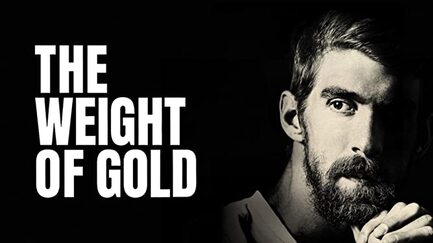A Quick Film Review
The approaching end of Mental Health Awareness Month inspired another look at last year's The Weight of Gold documentary, highlighting the more-common-than-you'd-think unseen challenges elite athletes face.

The Weight of Gold's other participants - fellow Olympians experiencing a variety of success - are frank in leveraging their personal insights, shedding light on the pervasiveness of added mental pressure.
Commentary from freestyle skier Jeremy Bloom (also listed as co-executive producer), diver David Boudia, figure skaters Sasha Cohen and Gracie Gold, bobsledder Steve Holcomb, hurdler/bobsledder Lolo Jones, skier Bode Miller, short track speed skater Apolo Ohno, skeleton race Katie Uhlaender, and snowboarder Shaun White help paint a picture which underscores the under-publicized struggles elite-level athletes face in high performance.
Driven by Olympic dreams from a young age, these athletes face a life hyper-focused on attaining Olympic success, with everything non-Olympic goal related viewed as an obstacle to block out. The narrow vision sets them up for shock once dreams are unfulfilled or end. What happens when they experience failure or end their careers? Too many are not prepared for how to define themselves outside of training for the one Olympic moment, and when the cameras leave.
Meanwhile, financial pressures while training often compound struggles. The vast majority of Olympians do not experience significant outside sponsor support, and any national team stipends are too paltry to adequately give relief to athletes with limited non-training time. Uhlaender is particularly powerful in her segments, revealing the added pressure of being the stipend support for the entire team, as the leader of a smaller, fringe sport.
Most poignant is watching included commentary from Holcomb, raw in his openness...filmed some time before his suicide in 2017. His death, following those of fellow Olympians Steven Scherrer and Jeret Peterson, was a marker in driving attention to mental health. But, unfortunately, not the last, as Kelly Catlin and Jack Hatton fell victim to depression just in the last couple of years.
The Weight of Gold's overarching message is what has been a glaring lack of attention to mental health from the structure of official team support, especially for retired athletes. The U.S. Olympic and Paralympic Committee has taken bigger steps of late...unveiling a mental health landing page and most recently a hotline. Obviously, these are steps in the right direction. (Note: the film's producers, along with HBO Sports has a resource page, too).
In its intimate moments, The Weight of Gold reminds us that Olympians, behind the veneer of super-human athletic power, are merely humans, too, operating under extremely charged conditions. It's great to see Phelps & co. use their platform as high-profile athletes to deliver the message that it's "okay to not be okay".
But these are doubtless just an extreme few of the countless stories out there. And what of the scores of athletes who don't make an Olympic team? As the Tokyo 2020 Games quickly approach, and as we look forward to enjoying elite performance, it's key to remember their humanity, too.


 RSS Feed
RSS Feed